Palm Oil Controversy
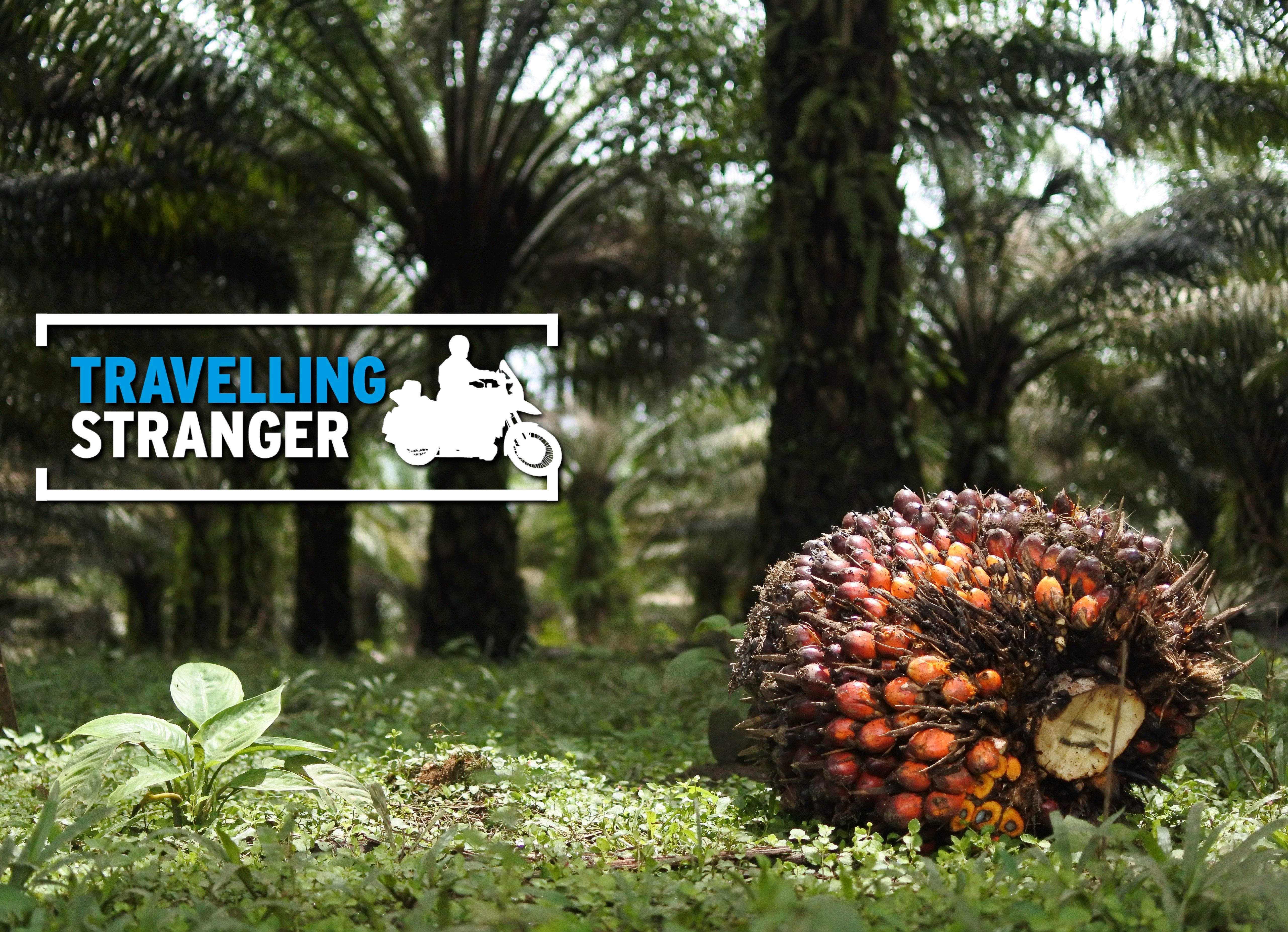 All pics by author
All pics by author
Hello my Steeming Pals!
Italiano
Durante la mia traversata del Sud-est asiatico in motocicletta non potei fare a meno di notare le immense distese di territorio dedite alla monocolture di olio di palma. Superficie enormi in Malesia, Borneo ed Indonesia sono ora a totale appannaggio di un’unica varietà di verde, di un’unica pianta: Elaeis Guineensis, una palma d’origine africana dai cui frutti si produce il noto olio vegetale in discussione.
L’olio di palma oggi è usatissimo sia nell’industria alimentare che quella cosmetica (e non solo). Basti pensare che v'è “palm oil” nella brioche del mattino, nella maionese, nel rossetto per le labbra, e nello shampoo per i capelli.
I frutti della pianta di palma assomigliano a delle piccole prugne rosso-giallognole. Da esse, dopo processi di macinazione, frazionamento e sgommatura si ricavano varietà sia liquide che solide di olio di palma pronte per i mercati internazionali (soprattutto il mercato asiatico).
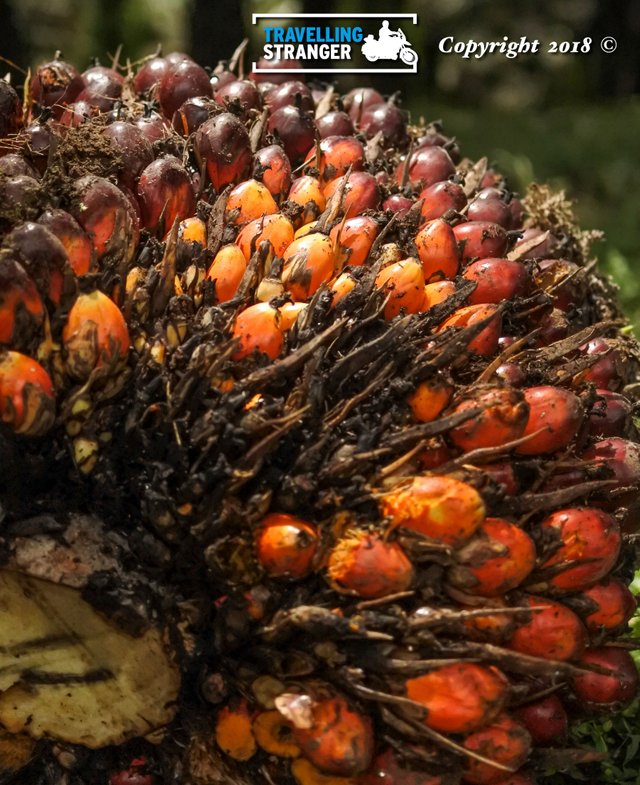
Palm oil fruit, looks like a small plum
Profitti alti e domanda sempre in crescita hanno fatto in modo che le colture di palma si siano imposte su altri tipi di coltivazioni nella penisola malese e nelle aree limitrofe. Lo sviluppo è talvolta stato incontrollato e le controversie che gravitano tuttora attorno alle piantagioni in espansione hanno creato scontri e dissapori spesso violenti tra comunità, autorità e coltivatori.
Alcune delle conseguenze della espansione delle piantagioni includono la deforestazione selvaggia con conseguente distruzione di abita e biodiversità, (orangutan, elefanti e felini uccisi o trafficati), l’erosione accelerata di terreni, la contaminazione delle falde acquifere con pesticidi e prodotti chimici. V’è anche la distruzione di intere comunità che in passato vivevano di piccola agricoltura e dei prodotti della foresta ora spazzata via per fare largo nuovi palmeti.
Le stime parlano di 6 milioni di ettari di foresta distrutta solo in Indonesia negli ultimi decenni. Si tratta di una superficie pari a 1.4 volte quella della Pianura Padana ed il fenomeno della demolizione continua con la tecnica dell’incendio e dello spianamento successivo del terreno arso con bulldozer.
L’Indonesia è uno dei paesi con la più grossa biodiversità del mondo in fatto di piante, insetti, vertebrati ed invertebrati. Alcuni specie animali e vegetali della foresta pluviale le conosciamo appena e non è da escludere che ve ne siano alcune che dobbiamo ancora scoprire e che ahimè, forse non conosceremo mai.
Chiaramente esiste l’altra faccia della medaglia. La coltivazione della palma è redditizia ed ha consentito a molti agricoltori di districarsi da condizioni di povertà cronica. I piccoli possessori di terreno ora possono accedere ad una vita più agiata: possono permettersi un’istruzione per i figli, permettersi una casa costruita con criteri moderni ed affrontare le spese per cure mediche quando occorre.
Sono le grosse società che controllano la maggiore produzione di olio di palma. Società quali la Wilmar International di Singapore, la Sime Derby malese, la Golden Agri Resources ed altre ancora. Esse rivendono il loro olio a gruppi internazionali noti tra cui la Ferrero (Nutella), la Colgate (sapone Palmolive), la L’Oreal e la Kellogg’s per citarne solo alcuni.
Non è chiaro se l’olio di palma possa recare danno o meno alla salute. È certo che esso consiste quasi esclusivamente da grassi vegetali di cui il 50% è della nefasta varietà satura. Nel contempo però, l’olio di palma contiene antiossidanti ed abbondante vitamina E che sono oltremodo salutari.
Come si può agire per evitare di essere complici della distruzione delle foreste asiatiche? Al contrario di quanto si possa pensare, boicottare i prodotti che contengono olio di palma non è una via indicata. Nel lungo termine forse l’olio verrebbe semplicemente sostituito con un succedaneo, quale ad esempio l’olio di soia la produzione della quale è pure afflitta da problemi ambientali.
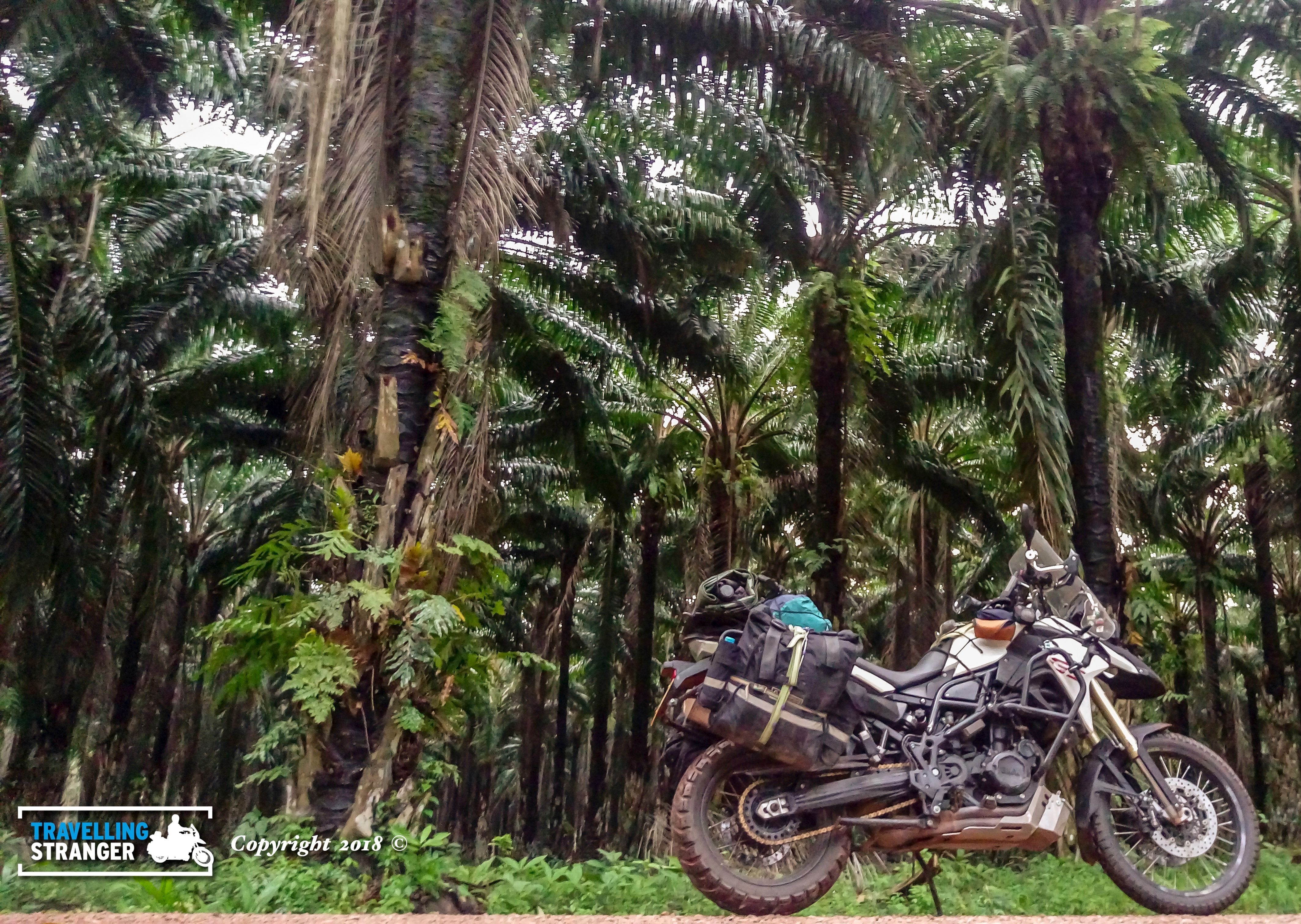
Riding through a plantation in Thailand
Occorre credo, esigere una coltivazione responsabile e sostenibile dell’olio di palma.
Dal 2001 esiste la RSPO ovvero la Roundtable on Sustainable Palm Oil. Trattasi di una organizzazione dell’industria di settore creata per definire delle linee guida, degli standard per la coltivazione sostenibili di palm oil. Tra i fondatori vi sono colossi come la Unilever e la Nestlè.
Tuttavia, la distruzione delle foreste asiatiche da quel lontano 2001 è continuata forse addirittura a ritmi più sostenuti e pochi membri della RSPO hanno mantenuto fede ai propositi sottoscritti dalla Round Table (mi sembra di capire che la L’Oreal sia l’unica).
Dall’olio per friggere alle stecche di cioccolato ai vasi di Nutella al detersivo per la lavatrice: l’olio di palma è ovunque. Non si scappa, si produce, si consuma, fa quel che deve fare molto bene.
Affinché la produzione di olio possa essere sostenibile forse tocca a noi consumatori agire in maniera più consapevole. Con internet possiamo informarci su quali ditte compiono scelte "sustainable" o meno. Potremmo scegliere di comprare i prodotti solo da organizzazioni che si comportano in maniera adeguata e che utilizzano olio da colture sostenibili. Non è difficile accertarsene. Basta inserire su di un motore di ricerca una scritta tipo: “Ditta xyz palm oil”…le sorprese sono garantite.
English
During the South East Asia portion of my recent motorbike adventure I couldn’t help noticing the sprawling monoculture palm oil plantations dominating huge amounts of land. Immense areas of Malaysia, Indonesia and Borneo are currently all the same shade of green, the colour of one plant only, the colour of Elaies Guinensis, a particular palm tree variety, native to Africa, that produces the fruit from which palm oil is extracted.
Palm oil is widely used today, most specifically in the food and cosmetics industries. There is palm oil in our morning croissants, some in the mayonnaise we might enjoy with our fries, a little in lipstick and a more in our favourite shampoo.
Palm oil fruit grows in clusters and is similar in appearance to a small reddish-yellow plum. The pulp and kernel of the fruit go through a refining process that includes milling, fractionation and degumming. The end products of the refining system are liquid and solid forms of palm oil both ready to be sold on international markets globally and the asian one most of all.
High profits and growing demand have fuelled an explosive growth in production of palm oil on the Malaysian peninsula and areas close by. This however has not occurred without controversy and sometimes violent debate with regards to the effects of what some have described as poorly regimented plantation expansion.
Some of the effects of the rapid growth in production include savage deforestation with the destruction of wildlife habits and ecosystems (orangutangs, elephants, cats killed or trafficked), land erosion and the contamination of ground water with pesticides and chemicals. There has also been the destruction of entire communities that in the past thrived on small scale farming and the products available from the forests now all cleared for new plantations.
It is estimated that in Indonesia alone, no less than 6 million hectares of forest have been destroyed in recent decades to make room for palm oil production. This is equivalent of roughly 1.4 times the area of the Po Valley area of Northern Italy (huge!) with the ruination continuing to this day by means of bush fires and bulldozers used to clear subsequent scorched land.
Indonesia has one of the biggest biodiversity’s of the world consisting of plants, insects, vertebrates and invertebrates. Some animal and plant species we know very little about and there are certainly varieties we ignore the existence of totally ...and might never get to know.
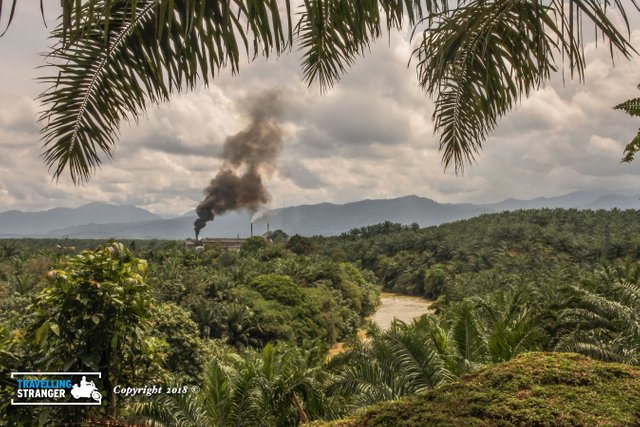
Processing plant in the middle of a plantation in Sumatra
Of course there are two sides to the story. Palm oil farming is lucrative and it has certainly disentangled many a small land owner from a condition of poverty. Today a small scale palm oil farmer can live a life of relative ease, afford to send children to school, build a house according to modern criteria and pay medical bills. Undenaiably there's some degree of prosperity gained.
However, it's the bigger plantation companies that control the palm oil Industry. Corporations such as Wilmar International based in Singapore, Sime Derby in Malaysia and others like Golden Agri Resources have a huge part of the market in their hands. They sell their oil products to well known multinational coorporations world wide, such as Ferrero (Nutella), Colgate (Plamolive), L’Oreal and Kellogg’s just to mention a few.
It’s not entirely clear if there are any real health hazards that come with the consumption of palm oil. For sure palm oil is made up mostly of vegetable fat and at least 50% of which is of the undesirable saturated kind. However, Palm oil also contains high levels of antioxidants and vitamin E which are both part of a healthy diet.
So what can be done to avoid being part of the forest destruction process in South East Asia? Contrary to what one would think, trying to boycott palm oil products is not a viable idea. In the long term it would mean finding an alternative to palm oil to satisfy industry demands. Such an alternative might fall on soya bean oil which of course comes with environmental issues of it’s own.
What's needed is sustainable, responsible and ethical palm oil production.
In 2001 representatives of companies involved in the palm oil industry formed the RSPO: the Round Table on Sustainable Palm Oil. It was intended as a board for the creation of guide lines and standards for ethical and sustainable production of palm oil. The Round Table was promoted by companies such as Unilever, Nestlè and others. However, regardless of the panel’s efforts and recommendations, deforestation has continued well beyond 2001, perhaps even at a faster pace than before with few companies that agreed to the RSPO guide lines doing much to honer the spirit of the proposals.
From French fries to chocolate bars, from nutella to washing detergents, palm oil is everywhere. You cannot escape it. It’s produced, consumed and it works well for it's intended purposes.
To make sure that palm oil is produced sustainably perhaps we, the consumers, can take a little action and behave more conscientiously. The internet these days allows us to easily check companies and their policies with regards to palm oil. Perhaps we can choose to buy products from those corporations and organisations that subscribe and enforce sustainable production methods.
It’s not difficult to find out which brands put an effort into ethical and sustainable palm oil policies. Those that do tend to advertise it openly.
Go ahead, check out your favourite brand of cookies! Use any search engine available and type “Company/brand xyz palm oil” You'll find some surprises out there for sure.
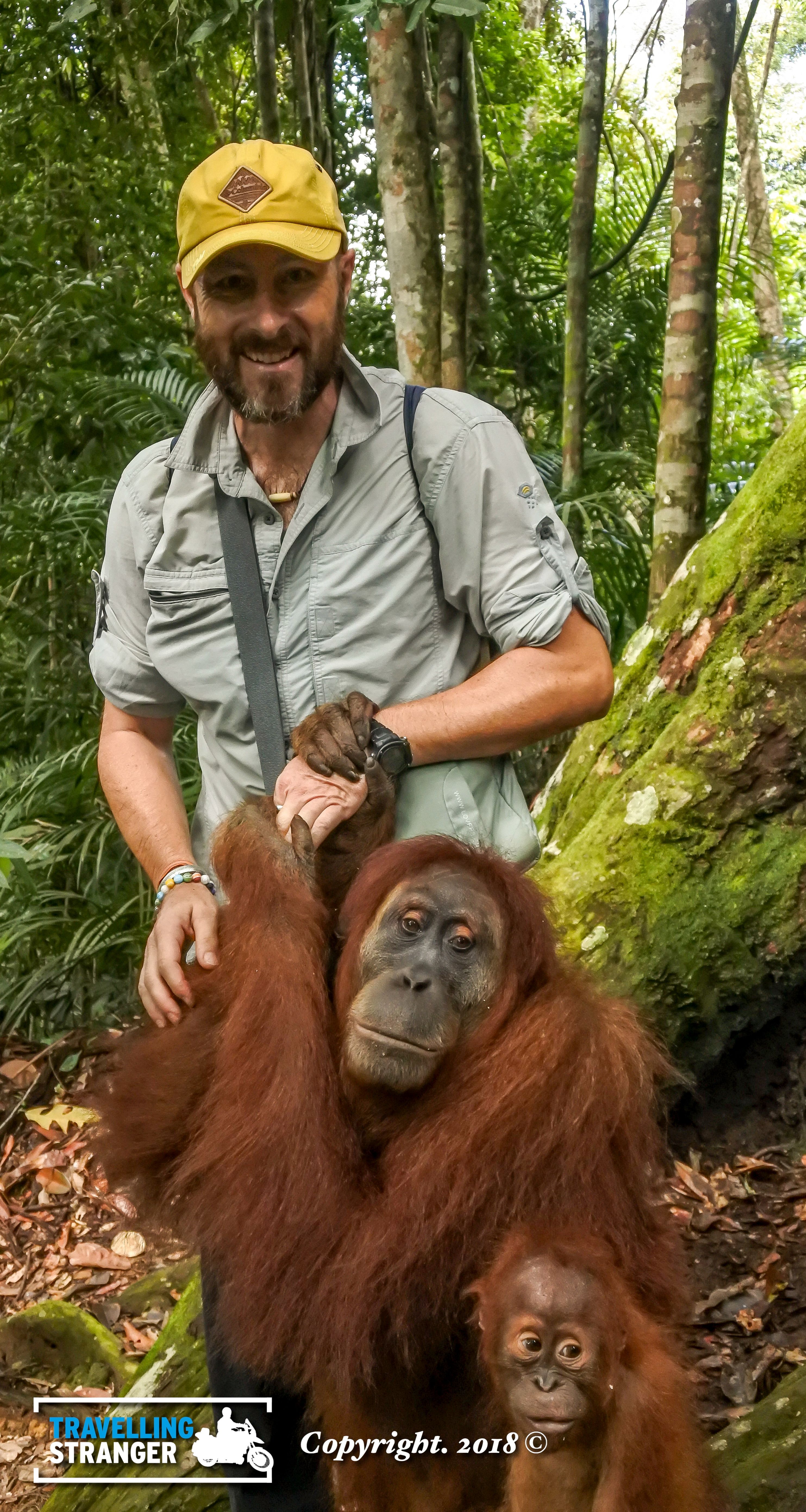
An orangutang handshake!
È un casino con questo olio di palma.... a parte che troppo di questo alimento alla salute non fa bene, l'essere umano fa sempre tutto al contrario al giorno d'oggi, strappa le palme dove crescono selvatiche e le pianta dove non ci vanno messe, lo stesso succede con gli edifici costruiti su un terreno instabile, prima tolgono tutti gli alberi e poi si meravigliano se arriva una frana....
Purtroppo abbiamo la memoria corta e l’abusivismo è difficile da combattere quando si ha fame o bisogno di materiale per scaldarci. La verità è che forse siamo davvero in troppi su questo pianeta... chissà.
Anche questo è vero, ma non do la colpa ai poveri, ma alle grandi ricche industrie.... non perchè sono ricche ma per come si sono arricchite.
I understand it's detrimental to the habitat to harvest palm oil on a large scale like what has been happening, perhaps more sustainable ways could be adopted instead of a boycott or to stop marketing it. I'm severely allergic to soybean and it's oil. Most of the north american diet uses soybean oil in just about everything and it leaves me with very little options. Since palm oil has gained popularity in our markets, it opens up a few more options to eat for me, I would be disappointed to have that taken away to be replaced by soybean again.
There is no simple solution. I am not personally against palm oil as ingredient in food stuffs nor against it’s harvest. What is needed is action against land grabbing and unregimented destruction of the environment in the name of profit at all costs.
Ho provato a googlare ferrero palm oil e i risultati sono davvero sorprendenti e inaspettati.
Se penso alle parole sono state dette su questa controversia, e agli articoli scritti dai quotidiani, trovo che la tua analisi equilibrata sia molto migliore (giustamente la responsabilità ultima sta a noi consumatori) e molto interessante leggere che hai visto quelle piantagioni con i tuoi occhi.
Ti assicuro che puoi scorrazzare per ore intere e vedere solo piantagioni, serpenti e camion pieni di caschi di frutta. Tutto uguale, tutto monotono. È quasi come una sorta di pulizia etnica. 😮
Incredibile...
Thanks... That is true and terrible... I knew about that problem in my trip to Indonesia just about 4 years ago.... that was a shock....I have in my memory a big hug from Jacky... They beautiful orangutan in Bukit lawang, Sumatra... For me she represent all orangutans... I just try to stop some products... But how you say... It is not easy... but at least we can try..big hug and thanks for sharing.
Ahhh, Bukit Lawang is magic. I have such great memories from there. Some scary ones as well when the river level rose suddenly over night and we had to evacuate :-). Hopefully it will survive the threats of plantation expansion.
Yes..it's so sad to see how bad the effects of deforestation to orangutans and other wild animals. While humans are busy reaping the profits from palm oil industries..tigers, deers etc are getting extinct.
6 millions of hectares is larger than the area of Pahang and Perak (2 states in Malaysia Peninsular) combined.
Hope the government can take action early before it's too late.
It sis a huge territory...and still growing in size. 😔
The scientist field is becoming alot like the banking field where they are getting to the root that the average person cant bring up to mind so they can have full control of are health and where the money supply goes
That's right, you said it.
Bel post, su questo olio di palma se ne è parlato e se ne parla tantissimo, alla coop lo hanno bandito togliendolo dai prodotti a marchio coop, le altre aziende continuano ad usarlo tranne quelle famose che ne approfittano mettendo un bel bollino con scritto "SENZA OLIO DI PALMA!".
Si, è cosi. Ho appena scoperto che i biscotti Oro Saiwa contengono olio di palma. Shit ! 😔
L'olio di palma è stato demonizzato oltremodo. Purtroppo è la lavorazione dello stesso che nasconde molte insidie. Alle alte temperature "potrebbe" sprigionare sostanze cancerogene. Poi sul contenuto abbondante di grassi saturi, hai già detto tu.
Le aziende hanno ecceduto nell'utilizzo, per via della facile conservazione in quanto a differenza di altri tipi di olii vegetali, quello di palma allo stato naturale è semi-solido. Ovviamente adesso che è finito sul banco degli imputati, tutti a scrivere che i loro prodotti non contengono olio di palma... ma fino al giorno precedente, che l'olio di palma ce lo mettevate, cosa c'avete fatto mangiare?
Molte catene fast food soprattutto fanno come dici tu. C’e da crederci, non crederci? Boh, chi lo sa? Dovremmo tutti forse imparare a coltivare il nostro orticello di nuovo, come fecero e fanno i nostri nonni ed i nostri genitori, con pomodori e melanzane. Li olio di palma non ci passa di sicuro.
La risposta é si! Ci farebbe bene alla pancia, alle tasche, al palato e alla salute in generale ;)
Alla pancia soprattutto!
Eh ma lì poi potrebbe esserci il problema delle pioggie inquinate o peggio... radioattive! Non è meglio il digiuno?
😂
https://steemit.com/love/@sarnaly/dad-miss-you#comments Check my post .Comment ,upvote and resteem keep it on
Hi sir @john-gpr now im follow you